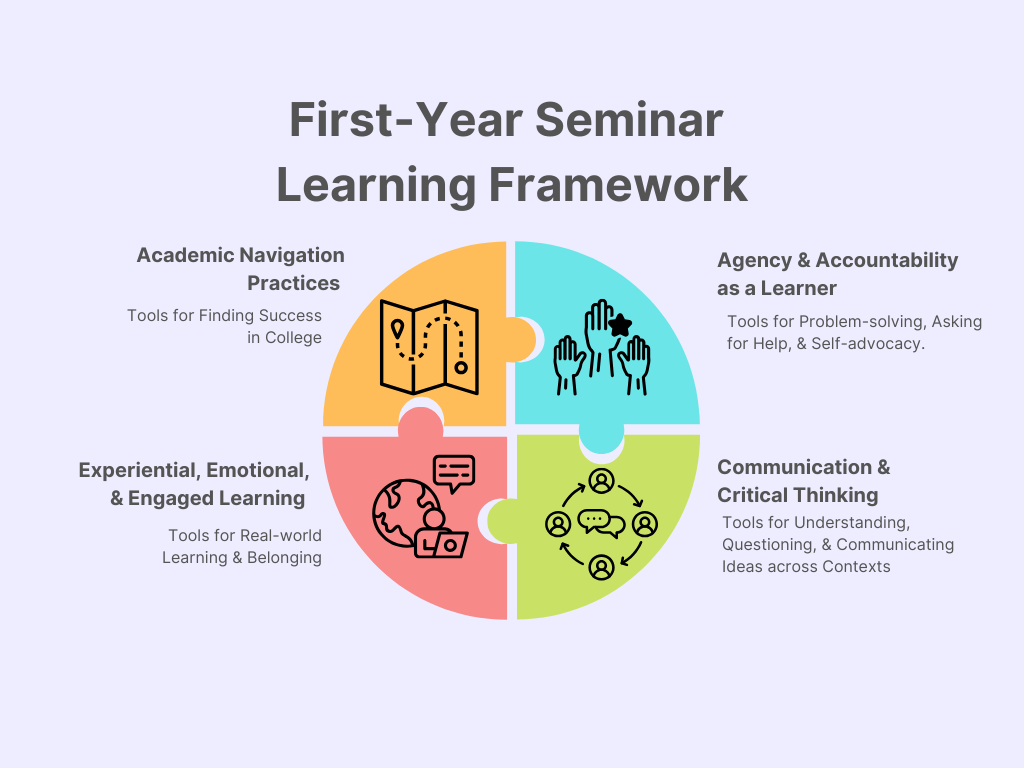
The First-Year Seminar is a cornerstone of the Arcadia experience, required for all first-year students during the Fall Semester. It’s designed to be your launchpad into university life. Think of it as much more than just a class; it’s a vital part of your transition to college-level academic culture.
What exactly is a First-Year Seminar? It’s a small, topic-oriented course that focuses on a specific subject and provides an introduction to the intellectual life of the University. You’ll work closely with a faculty member and your peers, engaging deeply with a topic through critical thinking, reading, and writing. With no more than 20 students per class, the small-group format allows for frequent and meaningful discussion and the formation of a close community of learners.
Your course will also feature a Peer Mentor, an upper-class peer to help build community and support our new students. You’ll also participate in several learning community activities throughout the course, such as field trips, guest speakers, campus events, and other hands-on experiential learning opportunities.
A significant benefit of FYS is the focus on developing essential academic skills. You’ll learn to analyze information and ideas critically, examine issues from multiple perspectives, and discuss, debate, and defend your views with clarity and reason. Many seminars also involve faculty librarians who assist with research and writing associates who help navigate the writing process.
The First-Year Seminar will not only hone your skills in critical and creative thinking, discussion, and writing, but also acquaint you with resources available for your learning and success at Arcadia. It is a shared infrastructure for student success, reflecting our collective responsibility to help you thrive intellectually, socially, and ethically from your very first semester.
Fall 2025 First-Year Seminars!
When choosing your First-Year Seminar, you’ll select up to six preferences from over 30 options. We encourage you to not just pick seminars that reflect your current academic interests, but also to consider topics that are novel and intriguing. Since First-Year Seminars are not linked to specific majors, this is a fantastic opportunity to explore new subjects.
Sample Courses
Expose Yourself to Art!
Why are some objects defined as art and others not? Who decides, and why does it matter? Through a combination of looking at, writing and talking about, and creating art, students in this course will explore the question “What is Art?” Close attention will be paid to how artists, curators, and scholars have answered these and other art related questions throughout history. The course will include field trips to local galleries and museums, and will feature lectures and presentations on a wide variety of art mediums and movements. Special focus will be the mural arts/street art and photography, along with trips into Philadelphia to experience art in the city firsthand. Students can expect to gain vital skills that translate to all facets of university learning and scholarship, while being charged to express and defend their artistic points of view using visual, written, and oral means.
Up Your Game
Do you play video games? Have you ever wanted to learn more about them, the history behind them, how they have changed society or made impacts in the culture of the United States? This course will focus on the impact that video games have had on our society in various aspects. We begin with a survey of the video game world and discuss its humble beginnings from Pong, to Mario, to Halo, and beyond. From there, we will look at historical based video games and compare them to actual events in history, and analyze how popular culture has been affected by our penchant for video games. Finally, we’ll explore the cultural effects video games have had on our society from opposing viewpoints.
The Hunger Games and Social Reality
The power of a good story lies not only in its ability to entertain, but also in its capacity to educate. They resonate on a deeper social, cultural, political, and even personal level and leave us changed. The Hunger Games and its sequels are great examples of stories that hold greater meaning for those willing to delve a little deeper—which is exactly what this class requires of you. After critically reading the novels, you’ll begin to explore how the dystopian future that Suzanne Collins envisioned is actually a reflection of our current social reality. Through weekly themed discussions, research, critical thinking exercises, and personal exploration, we will see just what this series reveals about who we are and how we affect the world around us. Some of the topics we will discuss include: gender roles, the environment, economic disparity and global inequality, revolution, war and violence, political oppression, reality TV, consumerism, and love. Volunteer as tribute, if you dare.
Reading Between the Rhymes
This is a discussion-based course that examines the history and complexity of hip-hop culture, its diversity, and role in social justice efforts around the world. Elements of hip-hop culture (rap, DJ, graffiti, and breakdancing) and mass media (including music, television, and film) will be used as tools to critique what we learn and communicate in our society about culture, race, social class, religion, gender, sexual orientation, and more. We will examine the influence of hip-hop culture on our critical consciousness for social change and use our individual and collective creativity to explore solutions for a more equitable society.
Bodies in Motion: Foundation for Physical Therapy
What is movement? What is the relationship between anatomical structure and function? How is movement acquired? What alters movement? What is physical ability and disability? This seminar introduces students to the science of movement and bioengineering as tools for analysis and adaptation. Visual observation of different kinds of human motion within varied locations and contexts serves as the framework for discussion of the individual’s, society’s and science’s approaches to the concept of physical ability. Strategies to address mismatches in physical ability and environmental demands underscores the seminar topics as students are guided toward an understanding of physically active individuals.
Questioning Gender
This course questions how we think about gender. When a baby is born, the first question asked is usually, “Is it a boy or a girl?” Is gender just about biology, or are there other forces at play? Focusing on the U.S., we’ll explore how the idea of two “opposite” genders, each with their prescribed attributes, has been culturally enforced through marketing, media, and other avenues. We’ll also look at how gender has been redefined during the last 50 years, as terms such as transgender, intersex, gender-queer, and gender-fluid have entered mainstream conversation. The course includes discussion, readings, videos, guest speakers, and a field trip to downtown Philadelphia.
Theater in Philadelphia: An Introduction
There's nothing wrong with feel-good Broadway-style musicals. But at its finest, theater is a serious art that provokes ambitious thinking, self-examination, and social engagement. This seminar exposes students to thoughtful dramatic productions on the Arcadia campus and around Philadelphia, explores the creative process involved in staging serious drama, and examines how Philadelphia-area artists are using the stage to engage with the vital political, cultural, and social questions of our time. Students attend performances, speak with theater artists, and develop critical skills for analyzing what is seen on stage.
Naked Words: Intimacy of Poetry
Bring your voice to the table. Reading poems aloud, sharing original work, and learning the art of critique will allow us to share dreams and disappointments. Our seminar, based on published and unpublished poems—yours and others'—will help you understand poetry's role in healing, creativity, and inspiration. We'll also explore how poetry can function as a form of celebration, mourning, or social critique. No prior knowledge is necessary; this course is open to both experienced and inexperienced writers.
Tyrants, Cult Leaders, and Heads of State: Unpacking the Myth of the Perfect Leader
There are leaders who inspire us to take risks, who we empower to lead us, and others who are responsible for some of the greatest atrocities in the world. What’s the difference between a good leader and a terrible one? Do Nelson Mandela and Charles Manson have any common leadership skills? Are Oprah and Margaret Thatcher cut from the same cloth? This class will explore traits-based and skills-based leadership theories and dissect the leadership resumes of some of the world’s best (and worst) leaders. From our study we will determine how to build leadership capacity—and a cult following.
Citizenship and the Law
As a citizen of the United States, do you know why every state in the union has a 21-year-old drinking age? Why our money reads “In God We Trust?” Why you can burn the American flag? This seminar explores the characteristics of an engaged citizen by studying milestone U.S. Supreme Court cases, which will provide you a better understanding of our government, history, and cultural norms. The class will complete a civics project called “Did You Know?,” which will help create discussion on campus about interesting topics you choose. To explore our culture, we will travel to Washington, D.C. or sites in Philadelphia.
Coffee and Tea: Origins, Economy, Ethics
Do you have die-on-this-hill devotion to cold brews? Have you set up your own cozy café in your room? Ever notice how so many people meet to talk over coffee and tea? Take this course to find out why our world is so focused on these drinks, even with their complicated origins and ethics. In class, we’ll hold optional taste tests of coffees and teas, explore the cultural and ethical aspects of coffee and tea, review and blog about coffees and teas, and even visit and observe cafes and tea houses. If you like deep dives and learning about other cultures, take this course and discover what’s really in your mug.
Do Animals Feel? The Psychology of Animal Emotions
What does the impressive intelligence of octopuses or crows tell us about their underlying emotions? Is your dog actually happy when you get home? Psychology is the study of the mind and behavior. But how can psychology help us understand the mental lives of other animals? What role do emotions play regarding behavior? What can we actually conclude about the mental lives of other animals and how that relates to emotions? In this course, we will use a wide range of readings, videos, and podcasts to enable in-class discussions regarding animal intelligence, behavior, and emotions. The course will focus on the psychological and neurobiological approaches to understanding animals’ emotions, however, our discussions will often lead us into the philosophical, even moral and ethical, approaches to animal emotions. By the end of the semester, students will investigate a self-selected topic and present engaging findings to the class.
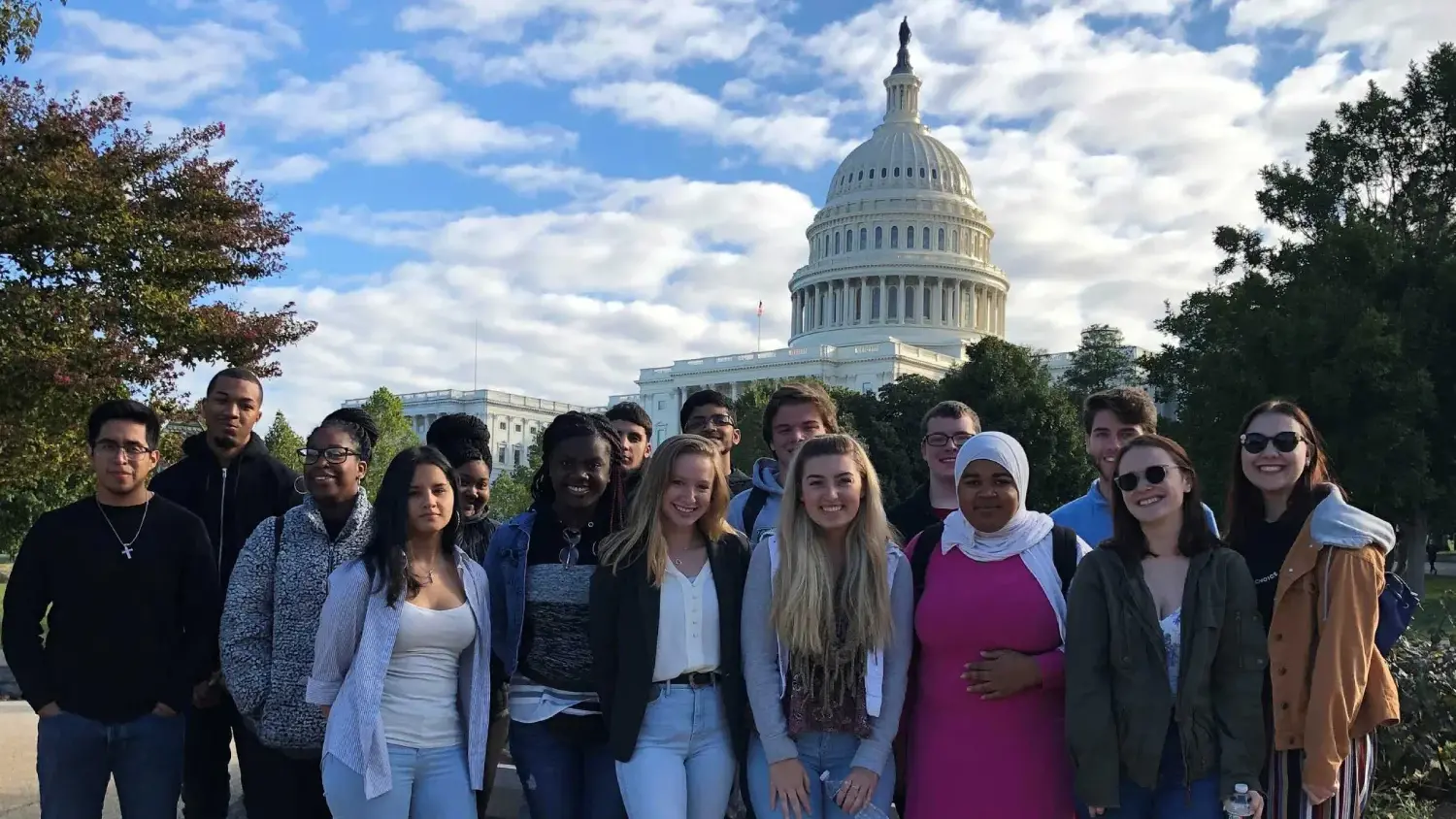
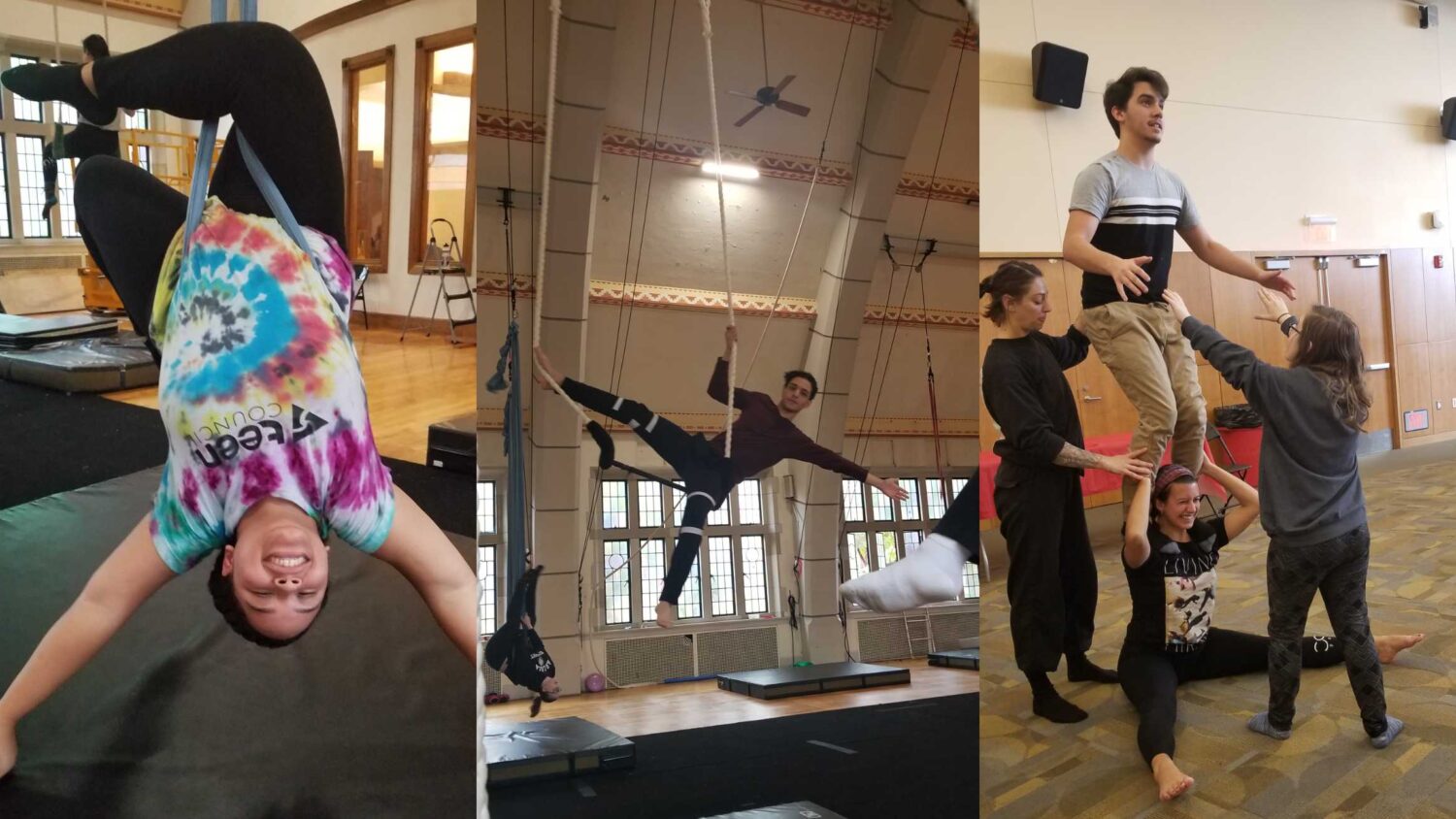
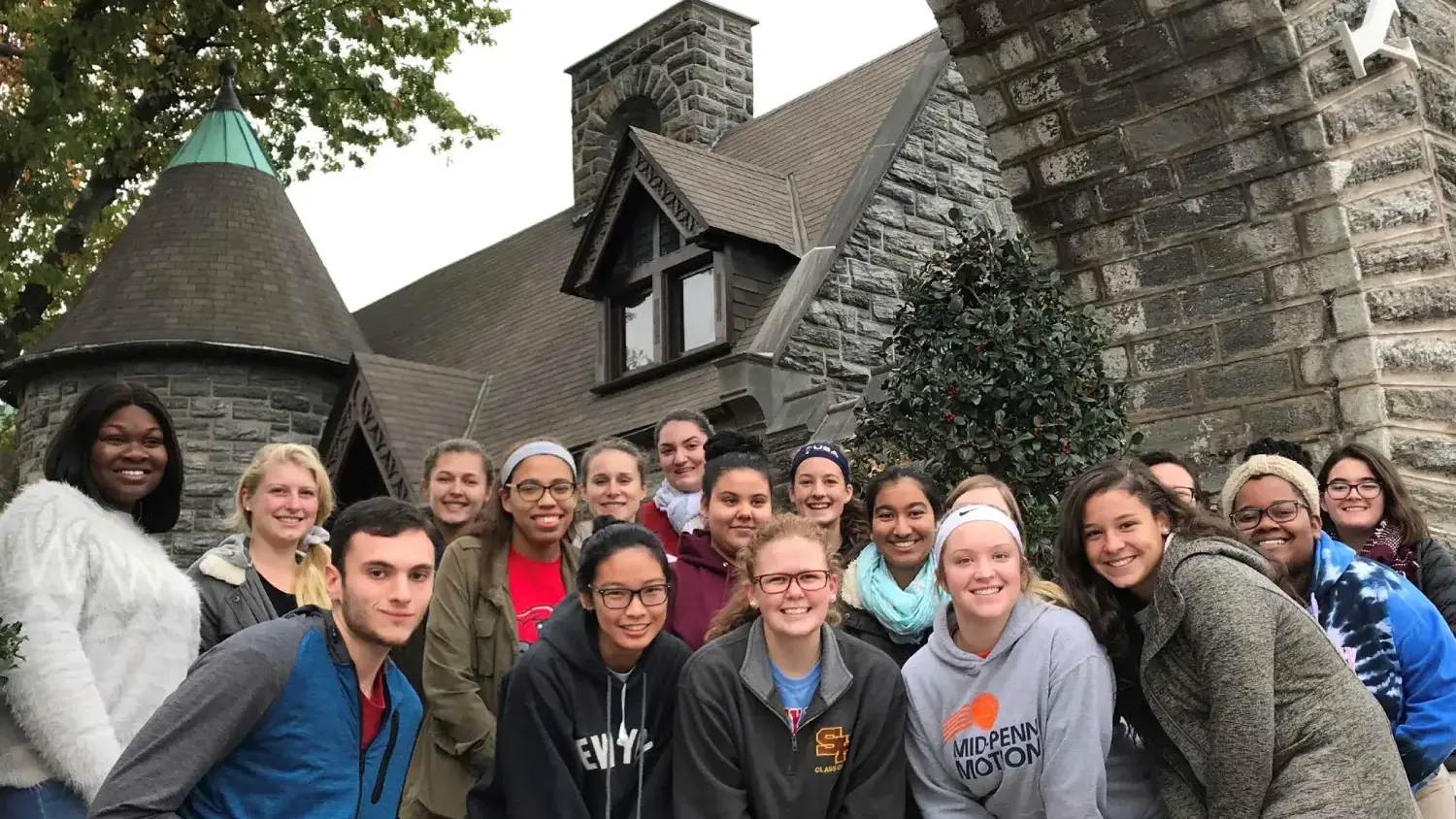
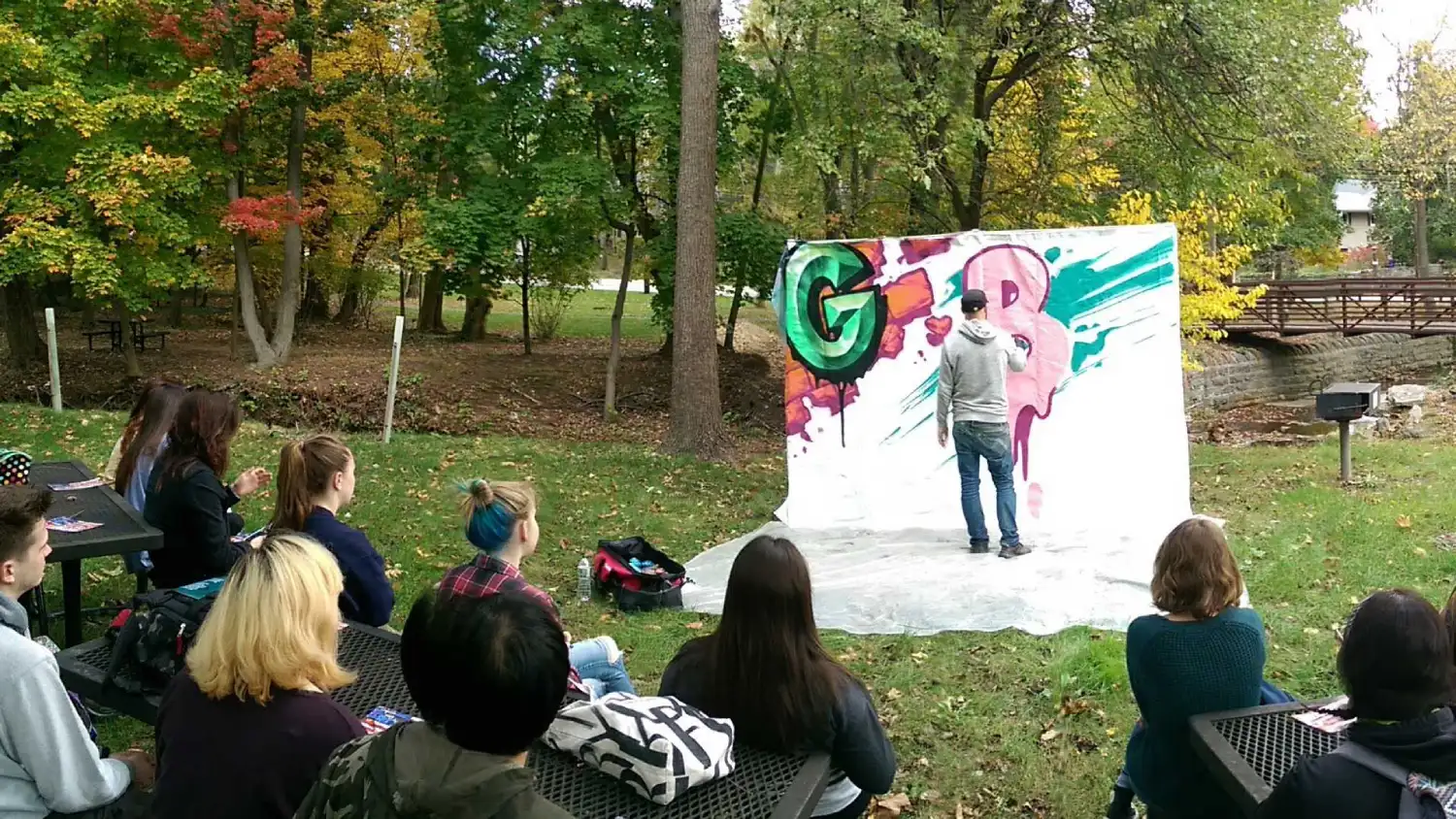
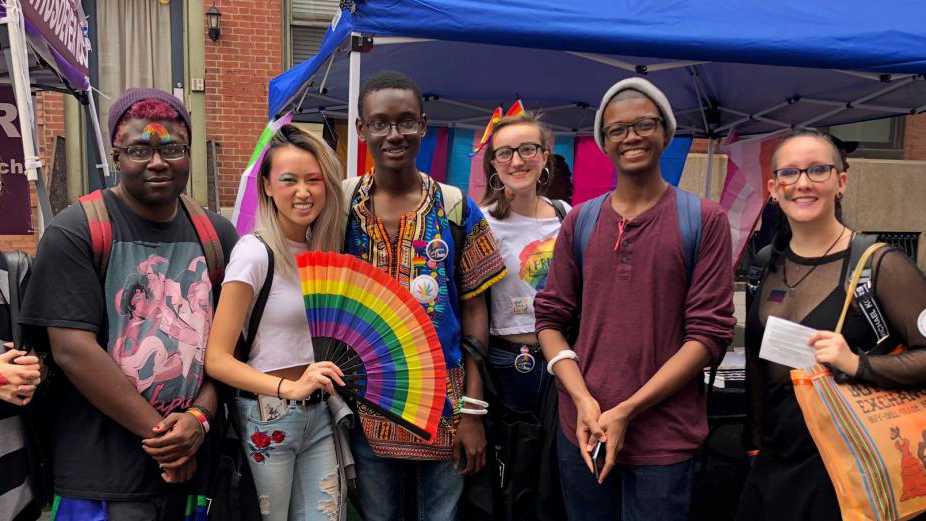





Citizenship and the Law
From Tent to Stage: Contemporary Circus in America
From Rags to Riches (and Back Again)
Expose Yourself to Art!
Questioning Gender
Citizenship and the Law
From Tent to Stage: Contemporary Circus in America
From Rags to Riches (and Back Again)
Expose Yourself to Art!
Questioning Gender
Learning Communities
First-year students are part of a Learning Community—typically in tandem with your seminar—which combines experiential learning and community-building through exciting activities and field trips (examples below). Your Learning Community will help you make friends, have fun, and extend your classroom knowledge as you explore intellectual questions in real-world situations.
Off Campus
- Traveling to Philadelphia, New York City, and Washington D.C. to visit museums and other cultural sites.
- Attending the Philadelphia Film Festival.
- Attending Broadway musicals or other theatrical productions.
- Visiting local courthouses.
- Competing in a scavenger hunt.
- Taking archery lessons.
- Braving a haunted house.
- Visiting a wolf sanctuary.
- Enjoying a group dinner together at a restaurant.
On Campus
- Hanging out, watching movies, and enjoying pizza together.
- Hosting “study and snacks” sessions during midterms and finals.
- Participating in the Empty Bowl Benefit Dinner.
- Hosting board or video game tournaments.
- Inviting experts and guest speakers to campus.
- Attending Arcadia theater productions or musical performances.
- Exploring art exhibitions at on-campus galleries.
- Collaborating with academic and administrative departments
- Attending an on campus event together such as Rock the Knight.

